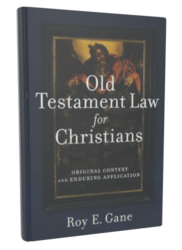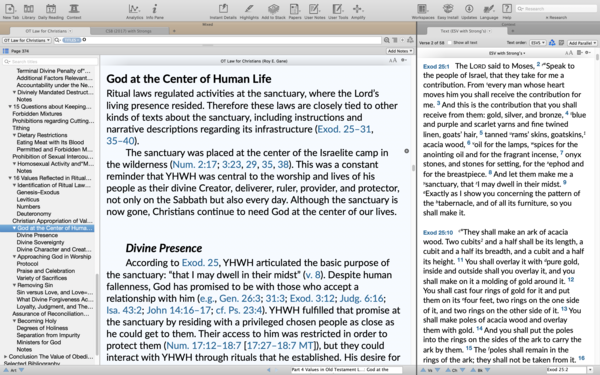 Christians have struggled to find a place for the Old Testament Law since the days of the Early Church. Acts 15 records the church’s conflict with whether or not to circumcise gentile converts as prescribed in the Law. In the second century, Marcion of Sinope was proclaimed a heretic for his extreme views of the Old Testament. Over the centuries, Christians have had no issue with laws such as “Do not steal” (Ex 20:15), but how does one approach a prohibition against mixing different materials in clothing (Lev 19:19)? And how should we handle all the laws concerning sacrifice and service in the Tabernacle, food laws, and commands relating to marriage?
Christians have struggled to find a place for the Old Testament Law since the days of the Early Church. Acts 15 records the church’s conflict with whether or not to circumcise gentile converts as prescribed in the Law. In the second century, Marcion of Sinope was proclaimed a heretic for his extreme views of the Old Testament. Over the centuries, Christians have had no issue with laws such as “Do not steal” (Ex 20:15), but how does one approach a prohibition against mixing different materials in clothing (Lev 19:19)? And how should we handle all the laws concerning sacrifice and service in the Tabernacle, food laws, and commands relating to marriage?
Adventist scholar Roy E. Gane has earned a reputation for being an expert on Old Testament Law. In his book, Old Testament Law for Christians: Original Context and Enduing Application (2017, Baker Academic and available beginning today for Accordance Bible Software), Gane sets out to provide understanding, clarity and application of Old Testament Law for today’s Christians. Rather than allowing the Old Testament to remain an obscure, rarely-consulted part of the canon, Gane wants to show how its values can be incorporated into the everyday faith of believers.
Old Testament Law for Christiansis is divided into four parts.
-
Part 1, “Getting into Old Testament Law” (chaps. 1–3), introduces the relevance, nature, and purpose of OT law.
-
Part 2, “Literature and Background of Old Testament Law” (chaps. 4–6), identifies locations of laws in the OT and law concepts in other genres, explains how OT law communicates values through its literary genre, and describes ancient historical contexts that shed light on OT laws.
-
Part 3, “Applying Old Testament Laws” (chaps. 7–10), exposes issues involved in direct and indirect application of OT laws to modern Christian life, reviews and critiques methods for applying OT laws, synthesizes a Progressive Moral Wisdom approach, and illustrates this approach through a case study.
-
Part 4, “Values in Old Testament Law” (chaps. 11–16), explicates moral values in the Ten Commandments and in social-justice laws, grapples with serious theodicy problems raised by some OT laws, and addresses questions regarding ongoing observance of several OT laws.
Roy Gane suggests a model for approaching Old Testament Law that he calls “Progressive Moral Wisdom.” It includes five components:
-
Analyze the Law by itself.
-
Analyze the Law within the System of Old Testament Laws
-
Further Analyze the Law within the context of its ancient life situation.
-
Analyze the Law within the process of redemption.
-
Relate findings regarding the function of the Law to modern life.
The book concludes with a reflection on the value of obedience to God’s will, followed by a select bibliography that guides the reader to further resources, some with additional helpful bibliographies. An extremely detailed index is available for readers to use the book as a topical resource for exploring how to understand and apply specific Old Testament laws. Gane uses the English Standard Version as his base translation.
Accordance users can add this title to their personal Accordance Library at introductory pricing for a limited time.
Old Testament Law for Christians
Regular Price $34.90


